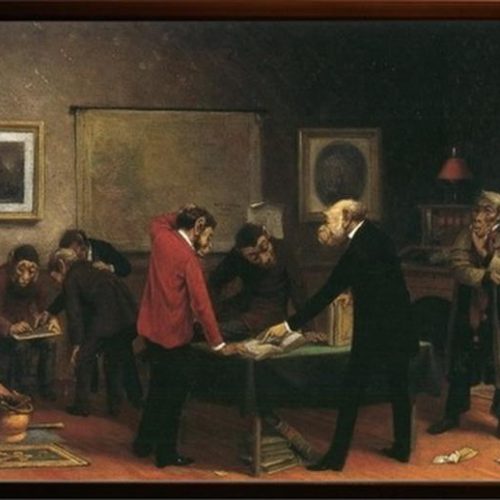Many things come to mind when we think of self, all tend to be difficult to define. These things, categorized under “self,” play a role in our motivation, how we act, how we perceive, and how we define who we are and who others are to us. One of the self’s essential elements is its way of defining a future in which we want to strive. What self-consciousness does is allow us to imagine what a future would look like and how we can improve that future. Self opens the possibility for long-term goal commitments.
For us to aim at goals that may take a lifetime to achieve, we must have a sense of a persistent self. Without that we would change goals without ever feeling the need to commit for past the times when the goal seems to lose its luster. Without that sense, things worth struggling towards would never be achieved, whether it is career oriented or whether it is the trial of being in a family.
This makes it sound like the self is entirely positive. But in some cases, the self can sabotage you. One’s own characteristics, of course, are not easy to define and therefore can lead to delusion and unnecessary self-restrictions. The self can make it impossible to develop, it stagnates, it neglects other possibilities. When we look at our selves and our long-term commitments, we must do so with caution that we may be in an illusion. But without understanding the self, we cannot hope to understand how to grow out of it.
What is the Self?
The self is defined in several ways, and there seems to be no universal or parsimonious models on how we define such a multifaceted concept. It becomes clear why that is the case when we see all the areas of psychology that selfhood plays a significant role in. It can be related to one’s self-conception, perceptions of freedom and competence, it can be in one’s relationships or public image. This article focuses on the motivational elements of the self and perhaps one of its core attributes.

For us to survive, we can be creatures of impulse and instinct, like a “simple” animal. We can rely on intuition to guide our actions, and, as it is for many animals, we’d survive and reproduce fairly successfully. But for us to thrive, and have the civilization we know today, we need a conception of the future towards which we act. Other animals have instincts that prepare for a future time, but they are unable to conceive of the future, to reverse engineer a more ideal situation. The simple instinct some animals have for storing food can bring a comfortable winter, but for us, that instinct initiates a way of planning and deliberating about the manner in which we should store our food.
What is required to consciously imagine a distant future? Intelligence and foresight, yes, but there is another element we need, an element which is the guide to what future we are motivated to plan for. We need to be able to imagine our future selves in the position that benefits from our present action. This requires more than intuition—it requires self-awareness.
The conception of self that informs us how to act presently in order to gain future reward or avoid future punishment contains many elements of the self that we think of when we normally refer to the self. Ideas of one’s reputation, competence, desires, or even possessions which come close to self-hood, are things that guide our actions to improve that “self’s” bearing in life. It is our reputation that we attempt to improve which increases our probability of positive social encounters. It is our possessions that we collect that would give us comforts as we age or buffer our misfortunes. There is very little, in terms of self-reflection, that does not take as its primary task the betterment of one’s future standings.
Belief in a Persisting Self
Why is a conception of self important to a long-term goal? The short answer is that without a belief in a persisting self, there would be no effort made towards improving the lot of that future self. The self is often called an illusion. That is true if an illusion is something that exists as potentiality rather than in actuality. If possibility is an illusion, then yes, so is the self. Sure, the future is not ever guaranteed, and that is why conceptions of the self can be false illusions, but nothing is certain enough to deny a self. Achieving the Buddhist “non-self” is certainly an achievement, but it is not found by hastily discarding the notion of self completely. More needs to be understood. The self-concept hangs on by a sort of faith.
Morality has deep ties with selfhood. Here we come to the faithful act of believing that if one acts properly, one will be rewarded in the future, even far off in the future. And for that to be the case, one must have a strong belief that one will persist in time and enjoy that reward, or be able to cope with the consequences. This enjoyment of reward can be vicariously perceived through the people who are enjoying the fruits of your labor. People “selflessly” improve the lives of future generations, but they feel the reward in their hearts too. For this reason, we must have certain beliefs in ourself and the probabilities of the outcomes of our actions.
“When the future self shares similarities with the present self, when it is viewed in vivid and realistic terms, and when it is seen in a positive light, people are more willing to make choices today that may benefit them at some point in the years to come.”
Hal Hershfield in “Future Self-Contiguity”
Commitment to Difficult Tasks
In order to better understand this future striving aspect of self, we can look at it through an idea of a singular goal commitment. The ego or self, is the conception that is responsible for all long-term goal commitments. The self arises from the combination of all those commitments, so thinking about a singular element of it will help us understand the self.

When we encounter the self in its most potent form, it is most often as it relates to our efforts to commit to our goals. It is in self-control where we weigh what is right with what is easier. If our goals were not harder than our intuitive actions, there would be no need for a self to motivate us. It would simply be natural to avoid unhealthy foods for the sake of long-term health. But since our instincts and habits tend towards the expedient, we need a conception of a possible future self that must cope with the consequences of present actions.
As we talk about the self, especially in the context of motivation and goal-striving, we can refer to the self as the commitment to long-term goals. It has the ability to continually over-rule the competing impulses and other goals that may come between oneself and the goal. Every long-term goal needs a persistent effort. To become good at anything, one must be diligent despite many feelings and struggles that demoralize the effort. It is these goals that a slip near the finish line makes all the previous effort become useless. It is the self that protects us from wasting past effort.
It takes a strong sense of self to persist towards a goal in the face of adversity.
Limits of the Self and the Need for Death and Rebirth
Consider our efforts to act in accordance with our “authentic self.” Which self is that? Is it our present self that seeks all things from simple pleasures to addictive impulsivity? Or is it our future self that tells the present self to subordinate itself to secure resources for future benefit? Or is it some new hybrid that makes both better simultaneously?
Intellectually we lean towards thinking planning for the future is the best way of being. We are always told the importance of saving money, eating healthy, and getting a secure job even if the work is miserable. That is the conscience or self telling us that. On the other hand, we are also told about the importance of being present, enjoying the simple pleasures, and living like today may be your last.

With this dichotomy in mind, I will define three ways in which the self, as it is defined here, can be a burden on us, and lead us to tragedy.
First, an important piece of knowledge one needs in order to have faith in one’s actions towards the future is the certainty that the future self will benefit from the rewards of such action. Knowledge of the world and self knowledge is vital in being able to act in a way that benefits future you. What happens often is that the single-mindedness of the self will neglect many of the other areas of one’s life that one desires. It will bring a future that is good in one way, but be hell in another. We may come to find that after we’ve worked single-mindedly towards one goal, we have neglected large areas of our life. If that is the case, the reward will be bittersweet, like claiming a trophy that signifies the hard work you put in, but also signifies the neglect of your family and other goals. And that is why self-knowledge is important. One must know if they are pursuing something that one would like in the future, or if you are pursuing something that someone else wanted them to pursue, and their commitment is because of a singular effort to avoid disappointing someone.
Second, when we think of self, we think of how we define ourselves in terms of our permanent traits. Although, scientifically there are many ways in which our traits are in fact persistent, these definitions attempt to preserve the self as a persisting entity that cannot change. When we define ourselves by our past actions (which seems innocuous enough), we are presenting a foundation for deciding to act because of the way we have previously acted. In this way, we look at how we’ve committed to a goal for so long, that the idea of discarding it would be a tremendous loss. We often cling to the chapters of our lives far longer than what is beneficial. To shed parts of the self is a way to grow as a human, but it requires one to reject a goal one has sought for a long time. This, in terms of biases and fallacies, is called a sunk cost, but when it happens to a goal, it is a crisis of identity.

Third, we must understand that we can change in unpredictable ways. You may live your life with great discipline and a strong sense of self, with great self-knowledge, but a crisis of self is never completely unavoidable. You may be working to attain things that you wanted several years ago, and before you had the cause to question the striving, you’ve realized you’ve spent far too much time chasing something you no longer desire, or had a poor idea of what it really was. This is a rather good crisis to have, because it is often a great lesson or a sign of successful development. Maturity and changing of life’s circumstances made that goal obsolete, but the striving towards it grew your character.
That “character” is what persists in all versions of the self. Whatever it is, it is the closest thing to a persistent self, a soul, some call it. You must find out what is stable in you and in people in general. Our greatest moral achievements are the perfection of this part of us, that William James calls the “spiritual self.” Our actions change the way we see the world, the way we act in the future, and who we become. It is through striving to improve the most persistent features of what it is meant to “be” that we create the highest goal to which we can commit.



